I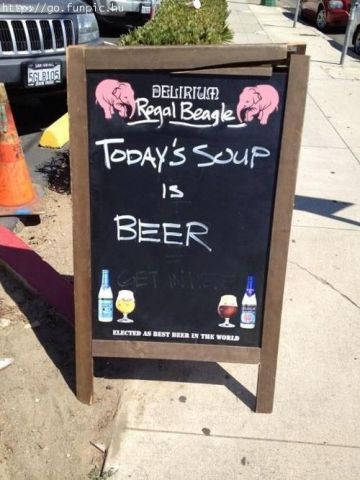
Scientific study just released 12 – 2014 ▼ ▼ ▼
http://blogs.redorbit.com/once-our-human-ancestors-stopped-living-in-trees-they-got-drunk/
I have for over a year now placed these three short “notifications” at the bottom of each page!
I just do not have the time.
My web site was really started as an informational site for beginning beer stein collectors that would be looking for the info and not the general public.
My So if one put in “Wood Steins” or “Hand painted steins,” it
STILL
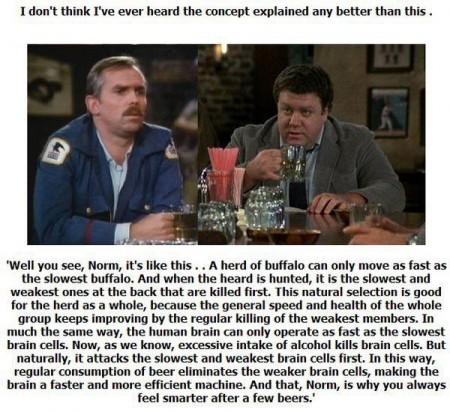
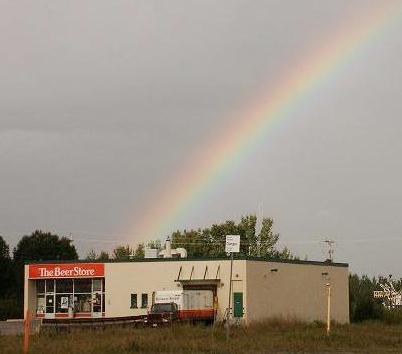

Accumulators versus collectors: Which one do you think this guy is? Heinrich Kath, a farmer, shows off some of his approximately 20,000 beer mugs in Cuxhaven, in northern Germany. Although he does not drink beer, (What?) he has been collecting beer mugs since 1997.

Coffeerand Oatmeal Beer ??
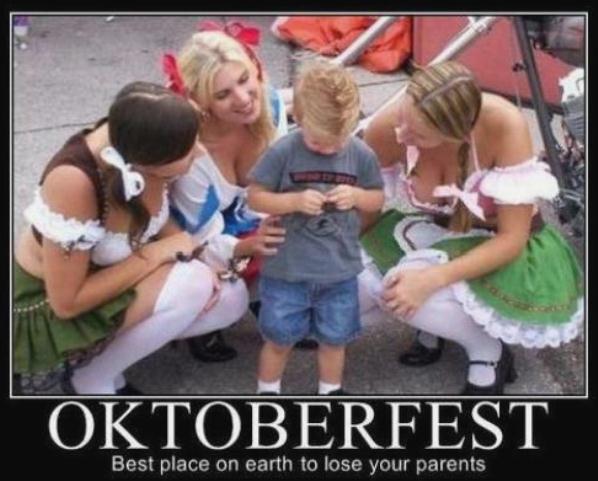
SINGING BEER STEINS:
ALONG WITH ‘FREE BEER”: [1] http://www.youtube.com/watch?v=qOSOuRYuY3g&feature=related
[2] http://www.youtube.com/watch?v=RkoQl9ztc4M&feature=related
BEST BEER BOTTLE OPENER , EVER ! : = http://www.youtube.com/watch?v=V85wleqv8zI&feature=related
NEWS FLASH:
Hungarian builders who drank their way to the bottom of a huge barrel of rum while renovating a house got a nasty surprise when a pickled corpse tumbled out of the empty barrel, a police magazine website reported.
According to online magazine www.zsaru.hu, workers in Szeged in the south of Hungary tried to move the barrel after they had drained it, only to find it was surprisingly heavy and were shocked when the body of a naked man fell out. The website said that the body of the man had been shipped back from Jamaica 20 years ago by his wife in the barrel of rum in order to avoid the cost and paperwork of an official return.
According to the website, workers said the rum in the 300-liter barrel had a “special taste” so they even decanted a few bottles of the liquor to take home.
EDITOR’S NOTE: DID ANY OF THEM SELL A BOTTLE ON EBAY?
A man is stopped by the police around 2 a.m. and is asked where he is doing at this time of night.
The man replies: “I am going to a lecture about alcohol abuse by drinking too much beer, the damaging effects it has on the human body, and its consequences.”
The officer then asks: “Really? Who is giving that lecture at this time of night?”
The man replies: “My wife.”
Why your beer is so expensive! From AOL Daily Finance, 5-19-2011
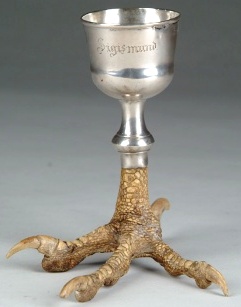
A GRIFFIN’S CLAW CUP – A DIFFERENT APPROACH, 5.5 INCH – This piece brought $300.00 at a house auction in 2010. I just hope they didn’t kill a Bird of Prey just to get his foot!
A RECENT [2016] ARTICLE ABOUT DRINKING
New post on Zythophile |
|
And speaking of “Carved Jugs’ – why are “firemen” always around old beer kegs ?
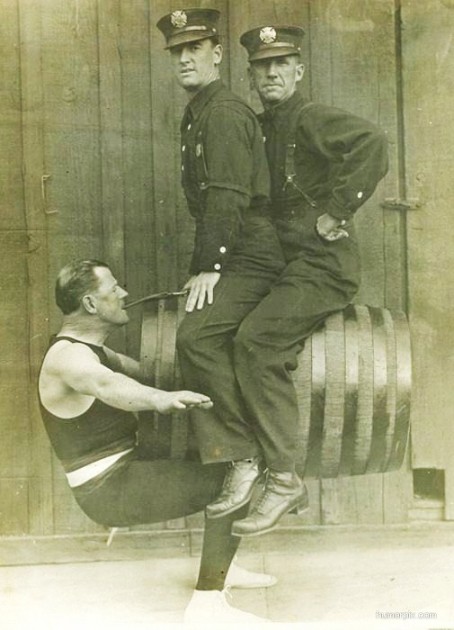
If you look at this too quickly, you might get the wrong idea of what’s going on!
“BEER”
To my friends who enjoy a stein of BEER… and those who don’t.
As Ben Franklin said: “In wine there is wisdom, in beer there is freedom, in water there is bacteria”.
In a number of carefully controlled trials, scientists have demonstrated that if we drink 1 liter of water each day, at the end of the year we would have absorbed more than 1 kilo of Escherichia coli,
(E. Coli) = bacteria found in feces. In other words, we are consuming one kilo of poop.
However, we do NOT run that risk when drinking beer & wine (or tequila, rum, whiskey or other liquor), because alcohol has to go through a purification process of boiling, filtering and/or fermenting.
Remember: Water = Poop, Beer = Health.
Therefore, it’s better to drink beer and talk stupid, than to drink water and be full of shit !
Then came an email came from a fellow collector and SCI Member:
Steve, In your never ending search for truth and justice, you might want to take a look at the quote “In wine there is wisdom, in beer there is freedom, in water there is bacteria.” that you attribute to B. Franklin I have no idea who said it but it wasn’t Ben. The reason I know Ben didn’t say it, is related closely to the stein lids/plague crap. They didn’t know much more in colonial times about the causes of illness then they knew in the 1300s. It wasn’t until the 19th century that people began to link the squiggly things they saw in microscopes to diseases. We have to explain that quite often during tours at Colonial Williamsburg when people ask why they drank so much alcohol, didn’t pay much attention to cleanliness, etc. The word “bacterium” is credited to a German named Christian Gottfried Ehrenberg in 1838 (that’s from Wikipedia, if you want to trust that.) “J”
“J” Many thanks for the good information and correct slant on this bit of humor, (YOU SPOIL SPORT!) SLS
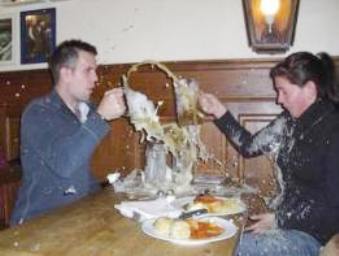
“Also worth mentioning is the old European superstition of clinking glasses together after offering a toast. Originally, striking glass together was believed to be a gesture that drove the devil away from companions while they were drinking. The sharp clear ringing sound of the glasses most resembled the chime of a church bell, which was certain to rid the drinkers of Satan.’” (Quote from Jim Sauer, SCI and Penn. Keysteiner’s Chapter )
THE ANTIQUE ROAD SHOW – http://www.youtube.com/watch?v=lTldLunUV7c&feature=related
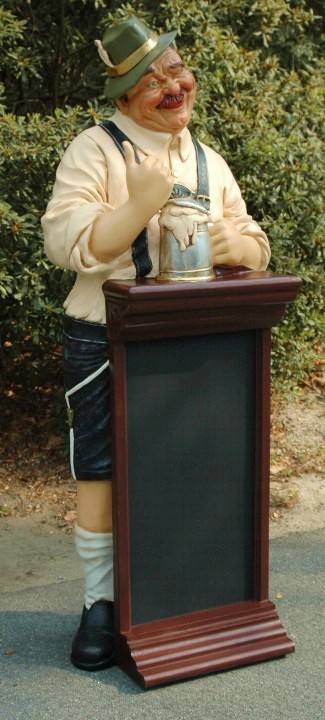
A chalk menu board. Almost life size. (On eBay, asking $700.00, 5-2011.) I’d like to have it here at “The Tavern.”
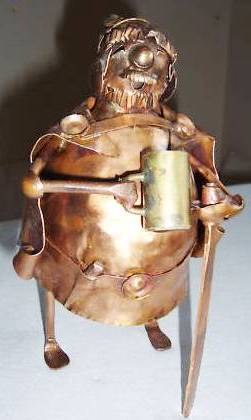
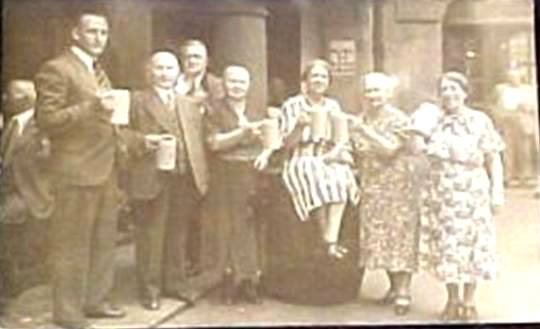
What some of the Munich Hofbrauhaus staff looked like in the early 1900’s.
.
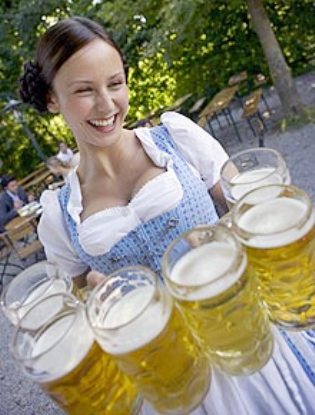
Above: Today’s versions of a Hofbrau employee.
And “Would anyone like to eat my goodies?”
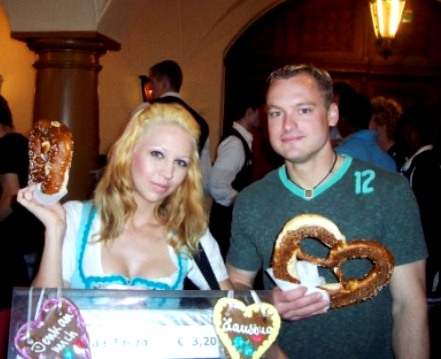
But it is not all about beer and pretty girls with big bust lines:
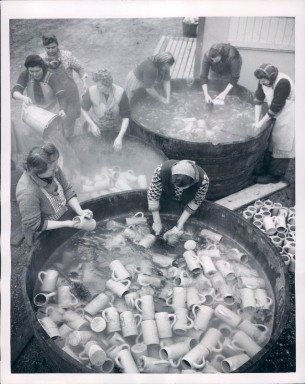
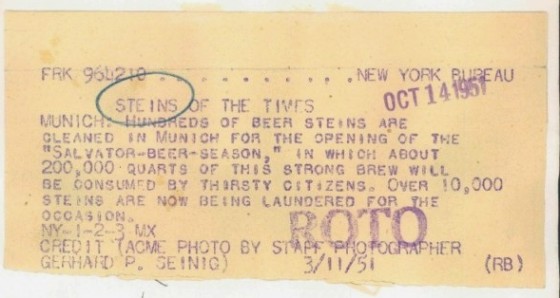
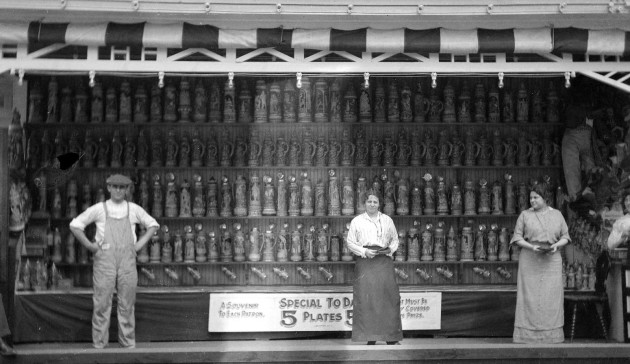
I am wondering who got to wash all these guys? Taken at Cooney Island Amusement Park, New York. Date unknown .
THE FEATURED HEADLINE FROM “THE MAGAZINE ANTIQUES” – SEPTEMBER 2139:
“The rare “Miss Piggy” enameled glas beaker brings a $2,200,000 top bid at auction.”
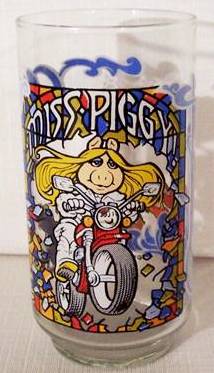
The drinking vessel collectors of the world were reeling today at the news that the famous “Miss Piggy” beaker set a new the world’s auction record for a 20th century press molded and enameled glass beaker. The re-aligned mega-auction firm of Sotheby’s-Ebay-Christies (“S-E-C”, now having offices in all 8,000 major US cities and 269 foreign countries) announced today that “Miss Piggy” destroyed the previous world record held by the “Brainy Smurf” breakfast glass beaker by at least $200,000.
The previous record for a “Miss Piggy” was set back in February of 2102 when the multi-millionaire Mr. Les Paul X, purchased it for his collection. Mr. Paul’s grandson, just called ‘Tenth’ by his peers, wasn’t available for this auction battle as he had recently used up what was left of the family fortune buying the only remaining copy (outside of museums) of the “Kiss –Tour, 2001” poster. First hand accounts indicate this ‘on floor-computer-cell phone-XM satellite” driven auction battle at “S-E-C” house was exciting to watch as three or four members of opposing organizations bid the little lady up. First there was the President of the “Don’t Mess with the Pig” Collectors Club, United Planets Chapter, Mr. Steven (he always spells it incorrectly) Steigerwald. Then there were also several representatives, including Aunt “Jusy” Stuart, from the local club of the “Rinkerettes for Harry”, whose motto is:“If it’s from the 20th century, it’s got to be great!”
The third group’s leader bidding for this prize was Mr. Wendell Barney whose family had made its fortune by selling titanium nipple rings to over sexed teenagers in West “By God” Virginia late in the 21st century. It was this group, “Sexed Crazed Teenager’s for G. .W. Bush the Tenth,” that spurred on the bidding to new heights.
Mr. Steigerwald, who had the lead at one point, told this reporter, “This gal just isn’t out there any more! I once had the opportunity to buy one at one of the 364 flea markets I attend every year, but another collector you might have heard of, a Mr. John Manning, XVI, got to the sales table just before me! He bought that beaker just because he was collecting Snow-Parrots from Antarctica and he had not found any that day .
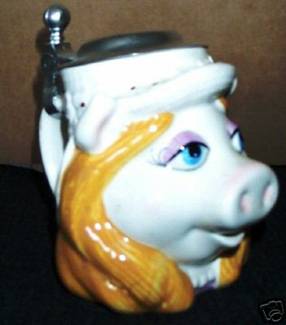
“Beauty is in the eye of the beholder and it may be necessary from time to time to give a stupid or misinformed beholder a black eye.” … Miss Piggy
“In order to avoid being called a flirt, she always yielded easily.” Charles, Count Talleyrand
Photo and all ad captions sent from a fellow Gambrinus Beer Stein Club member:
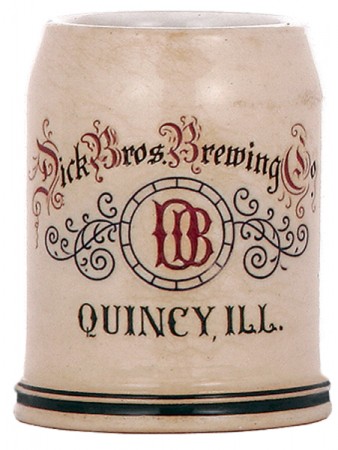
[TSACO]
What was their slogan? “Nothing tastes better than Dicks.”
“If you’re out of Dicks, you’re out of here.” [or] “Dicks, the pause that refreshes.”
[or] “You can’t have just one Dick.”
And once you have your “Dick’s”, should not you drink from this beaker?
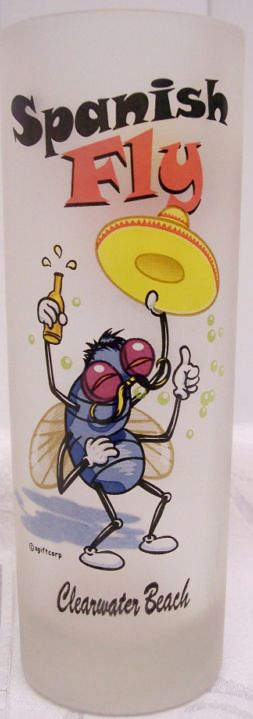
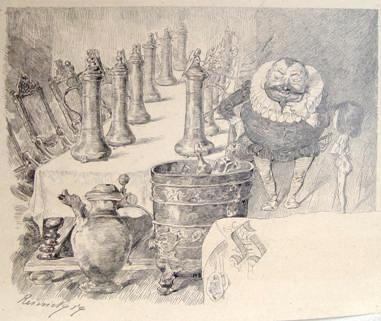
An interesting drawing. It was on German eBay in 2-2011. I’d like to have a table that long enough and have that many pewter servers to accommodate “me and me buds at a “stein clique meeting.”
Reinicke, Emil (geb. 1859 in Zerbst): “Eine festliche Tafel für wackre Zecher” originale Bleistiftrzeichnung auf Malkarton ca. 19x22cm; signiert und datiert “(18)89” Zeichnung aus dem Archiv des Braun&Schneider Verlages zu München; Vorzeichnung für den Abdruck in der Zeitschrift die “Jugend” , “Fliegende Blätter” bzw. “Simplicissimus”.
Which is: “Reinicke, Emil (geb. 1859 in Zerbst): ” A festive board for wackre Zecher” original Bleistiftrzeichnung on mark cardboard approx. 19x22cm; marked and dated ” (18) 89″ Design from archives of the Braun& Cutter of publishing house to Munich; Draft for the casting in the magazine ” Jugend” , ” Flying Blätter” and/or “Simplicissimus”.”
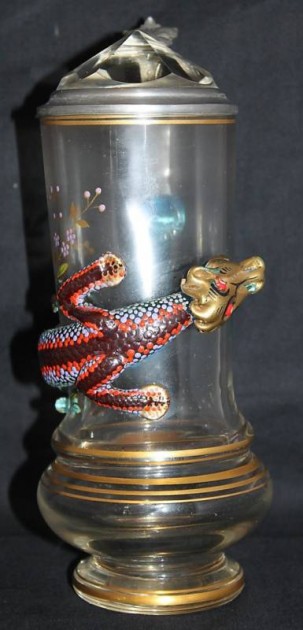
Maybe not too “weird” but certainly different! I have never seen another one like it . The snake is applied and enameled glass.
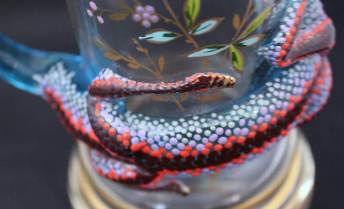
Enameling detail.
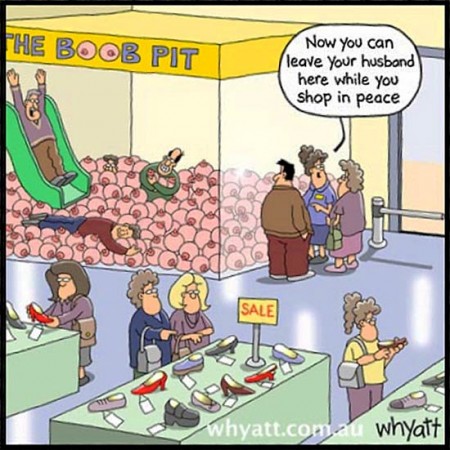
Has almost nothing to do with steins — just funny I thought, and true! This would have been more relevant if it had shown an antique shop.
And if you think I’m kidding – here is one of the finalists in the contest of our “Ugliest Stein of the Year, 2011, ▼” so please tell me who do you think it was designed to appeal to?
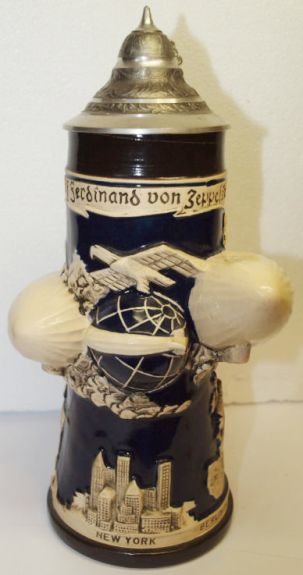
.
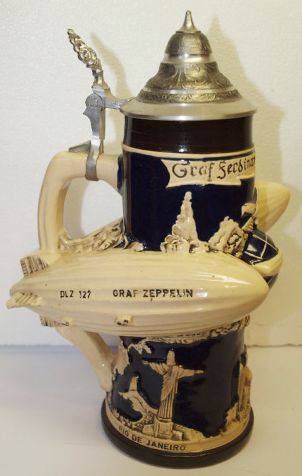
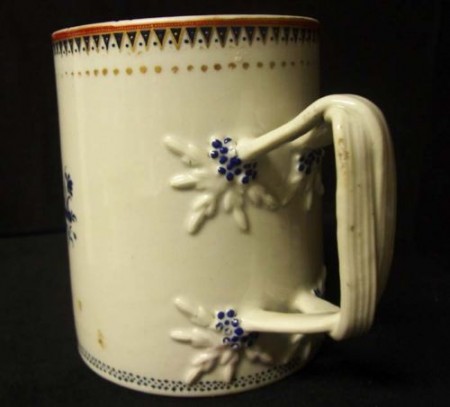
I first thought the design at the end of the handles to be claws, but looking closer they appear to be I don’t have a clue. Do you ?
The first answer from a fellow collector and friend: “I think the handle is a vine and the raised part on the mug where it attaches is leaves with berries. Do I get a prize for solving the mystery? C.M
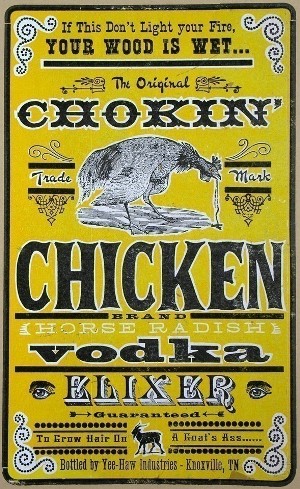
Chicken “horse radish” vodka! Yummy!!
\
STEVE SMITH’S “REAL” RESUME
Known to almost all USA beer stein collectors, Steve is a tall, fat bellied, retired firefighter having made his way through the ranks from “Firefighter” to “Fire Marshal” of Dinkey-Do County by cheating on tests and bribing county officials (it was thought by the County Police, but we must stress here – never proven (!), that Steve also ran the Fire Department’s porn and private sex club operations.)
Steve was married once but she got smart and divorced him after 17 years. He got the house, the kids, and the stein collection, of which he says, “3 out of 4 isn’t all bad!” For the last 25 years Steve has been paying Julia to live with him, for appearances sake; as it is rumored that he and Frank (somebody or other) are really engaged.
He started to Gambrinus Stein Club (VA. -MD. –DC.) to sell off all his “under paid for – over priced’ steins he had bought before 1971. He has been a member of SCI since 1971 and in that short time has managed to severely piss off Don Daughtery, Jack Heinman, Jack Lowenstein, Louis Foster, Clarence Riley, Les Paul, Gene Manusov, Walt Vodges, and most recently Jim Sauer in New Jersey.
Jim DeMars (Florida) will put up with him and that’s only because Skip, his wife, feels sorry for him. (She prays for Steve every day ever since he made nasty words with “Alpha-bits” cereal on her dining room table.) Laura Sedlmayr (“Boogie-Bear” to her beer stein collecting friends) let him sleep with her dog on the February 2004 trip to Florida.
Steve is presently out “on good behavior leave” from the Western State Mental Hospital in Stanton, Virginia. His favorite drinking vessel is the Miss Piggy glass beaker (way above.)
He thinks he knows a lot more about beer steins than he does!
and
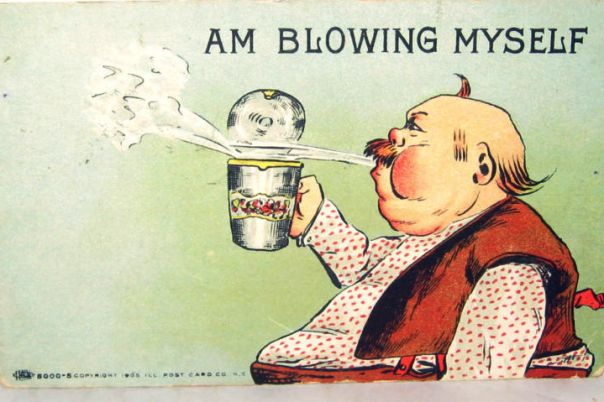 ???
???
AND SPEAKING OF WOMEN’S ANANTOMY:
Royal Sex Toys
The secrets of Prince William’s “college of love.”
By Tony Perrottet Posted Tuesday, April 12, 2011, at 5:12 AM ET
Reprinted from SLATE: http://www.slate.com/id/2289902
“Prince William and Kate Middleton. As the wedding bells echo from Westminster Abbey and millions tune in to watch the royal nuptials, the media will replay over and again the story of how Prince William and Kate Middleton began their fairy-tale romance at the University of St. Andrews in Scotland, where they met as frisky art-history students in 2001. (William later changed his major to geography.) The 600-year-old college has been elevated in the popular imagination as a magical Old World setting for royal love. It has even received the full-blown Hollywood treatment in a lavish Lifetime movie, which depicts the dewy-eyed undergrads frolicking through its medieval cloisters and leafy, cobbled alleys.
To the hordes of journalists and tourists who have lately made the pilgrimage to the hallowed campus 55 miles north of Edinburgh, St. Andrews appears stately, dignified, and predictably dull, as manicured as the ancient Scottish golf courses that surround it. But hidden away in one of the more modern university buildings, near the police station, is a cache of erotic relics from Britain’s longest-running and most perverse sex club, which boasted as a member none other than one of Prince William’s royal ancestors. Few visitors to the Museum of the University of St. Andrews know to inquire about the BBWCC, the “Beggar’s Benison and Wig Club Collection,” although it is notorious with curators and a small group of scholars. But if you make a formal application (and the serious academic purpose of your research is accepted), staff members will take you to a clinical room, don latex gloves, and slowly unpack several archival boxes of rare historical artifacts. There are drinking glasses in the shape of giant phalluses.
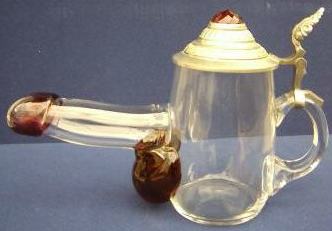 [NOT IN FWTD!]
[NOT IN FWTD!]
.
Lewd platters are engraved with surreal pornographic images, including erections shaped as lighthouses and roosters with human penis heads.
One prize exhibit is a snuff box filled with female pubic hair that was plucked by one of William’s most debauched and lecherous royal relatives, King George IV, the prince’s fourth great-granduncle, who ruled from 1820 to 1830. And a timeworn case contains a ghoulish wooden mannequin’s head whose peculiar erotic purpose can be traced back to another randy royal forebear, King Charles II. (The bloodline of the Merry Monarch, who ruled from 1660 to 1685, runs to Prince William through his mother, Lady Diana, via several of Charles II’s illegitimate sons.)
What is intriguing to the modern eye is that these ribald artifacts hail from a period in history that most of us assume to be very conservative, with men in powdered wigs and women in tight corsets politely courting over tea and buttered scones. The bizarre relics belong to a group called the Beggar’s Benison, the longest-lasting of the dozens of “enlightened” sex clubs that emerged across Britain in the Georgian era and are referred to generally as Hellfire Clubs.
This gentleman’s society was founded in 1732 in a damp Scottish fishing village called Anstruther, a few miles from St. Andrews on the East Neuk of Fife. Despite the detailed information we have on its lurid club rituals, they have so far never been featured in a British period drama. (Then again, it’s hard to imagine Sir Anthony Hopkins and Emma Thompson accepting the roles.) According to the surviving club minutes and firsthand accounts, the Benison’s male members—who were drawn from all sections of educated Scottish society—would gather every month in an Anstruther tavern. Early in the evening, naked village girls, known as posture molls, posed on tables in acrobatic positions to reveal “the Secrets of Nature.” Pornographic texts were read. They would then make toasts from the lewd drinking vessels, known as prick glasses, citing “Firm erection, fine insertion, excellent distillation, no contamination.”
The club president would then open up the wooden box, revealing a motley wig that, according to club tradition, had been woven from the pubic hairs of King Charles II’s many mistresses. Members would take turns wearing it, evidently using the talisman to enhance their sexual potency.
Finally, the boozed-up and merry members would gather around a table. There they would masturbate onto the club’s fine pewter plate, known as the Test Platter. (As the club minutes put it laconically on one occasion in 1737: “24 met. … All frigged.”)
According to David Stevenson, professor emeritus of Scottish history at St. Andrews University and author of the seminal academic study The Beggar’s Benison: Sex Clubs of Enlightenment Scotland and Their Rituals, the club was so popular with businessmen that chapters opened wherever Scotsmen traveled, from London to New York and even in the far-flung colonies of India and Australia. Its irreverent rites gleefully mocked all forms of censorship and sexual repression, including the newly popular medical fiction that masturbation posed a serious health risk, and it attracted non-Scottish members up to the highest echelons of British society.
King George IV became a member of the London chapter in his dissolute youth, and he always kept a soft spot for it. When he visited Edinburgh on a royal tour in 1822, he presented the Benison’s leadership with a snuff box containing pubic hair taken from one of his own mistresses. (Today the object still contains a tight wad of curls, now turned silver but with a faint ginger tinge.) The king may have chosen the gift because, back in 1777, a rebellious Benison member had made off with the beloved pubic wig and started his own breakaway club in Edinburgh, the Wig Club. In this society, new members were obliged to add a hair from their own loved one’s nether regions, helping to renew the headpiece’s fraying size. In fact, George may have intended his contribution to serve as the embryo for a replacement wig.
The Benison proved to be remarkably resilient, lasting for more than a century. But in 1836—the year before Queen Victoria’s accession to the throne, ushering in a far less fun-loving era—the club held its last meeting in Anstruther, and it petered out elsewhere. In the repressive Victorian atmosphere, the relics of most British sex clubs were destroyed by disgusted relatives.
But many of the Benison and Wig Club items miraculously survived, passed hand-to-hand around Scotland for generations. In 1921, a history-loving Scottish army officer named Col. Robert Maxwell “Canch” Kavanagh tracked them down and even tried to revive the club rites for a while, without success. (“Male bonding rituals had rather changed,” Stevenson told me dryly.) His cache was eventually donated to the Museum of the University of St. Andrews, although sadly, the most infamous item, the pubic wig, was lost.
Despite the proliferation of sex museums in Europe, the Beggar’s Benison and Wig Club Collection has never been publicly displayed. (“St Andrews is such a family tourist spot,” one museum assistant explained, when I inspected the fabled items. “There was some thought of exhibiting a few of the tamer items, but it was vetoed. I mean, how do you explain what they were used for in a G-rated way?”)
Today, we can only speculate as to whether Prince William was aware of the sexy stash at his alma mater and the royal connections that swirl around it. And the mysterious disappearance of the Wig Club’s legendary mascot, last seen in a lawyer’s office in Leith in the 1930s, should give royal conspiracy theorists pause. Millions believe that Jack the Ripper was the minion of Buckingham Palace and that a Secret Service assassin took care of Lady Di and Dodi. Surely the palace agents could spirit a royal wig out of a solicitor’s filing cabinet …
If so, Kate Middleton may be in for quite a surprise on her wedding night.”
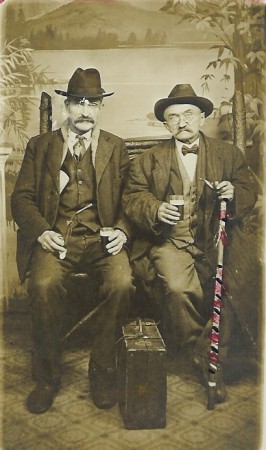
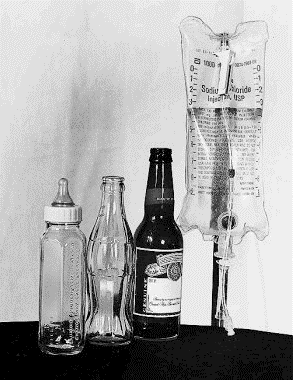
[L] SCI members #0115 (Smith ) and SCI #5690 (Barney) having a brew after a heavy day of eBaying and [R] the four stages of our lives.
Below: A view of Baby Steve’s baby bottle!
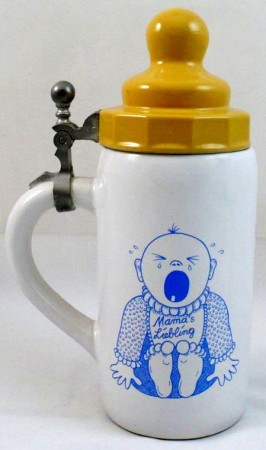
[END – SOK – 33 – DD]
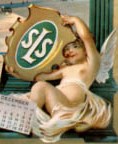 “Alcohol is a perfect solvent: It dissolves marriages, families and careers.”
“Alcohol is a perfect solvent: It dissolves marriages, families and careers.”
.
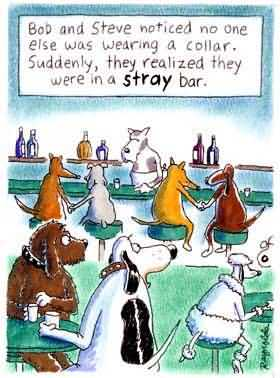

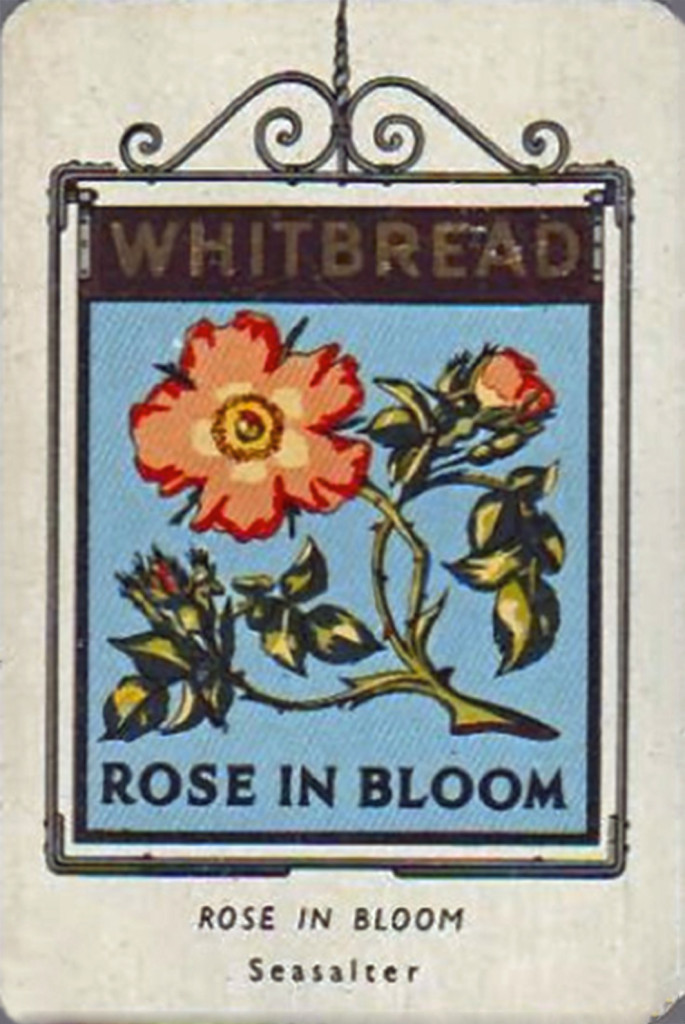
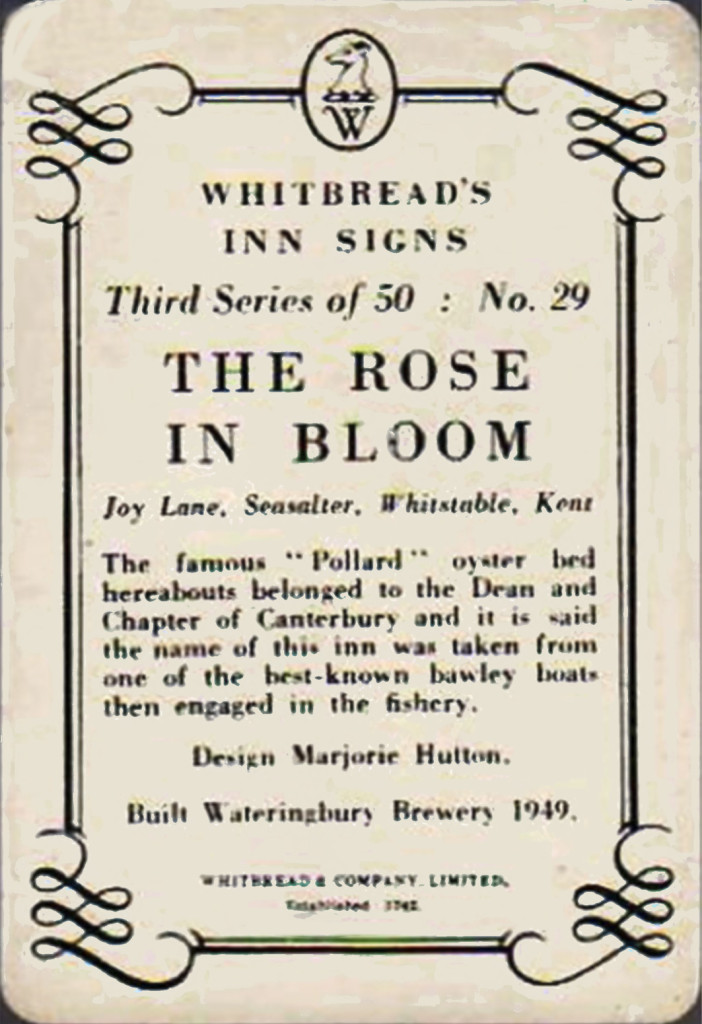
Leave a Reply